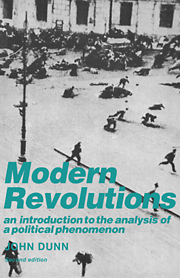Book contents
- Frontmatter
- Contents
- Preface to the first edition
- Introduction to the second edition
- Introduction: the ideological dilemmas of moden revolution and its analysts
- 1 Russia
- 2 Mexico
- 3 China
- 4 Yugoslavia
- 5 Vietnam
- 6 Algeria
- 7 Turkey
- 8 Cuba
- Conclusion: approaches to the ideological assessment and causal explanation of modern revolutions
- Notes
- Bibliography: guide to further reading
- Supplementary reading, 1971–88
- Index
- Frontmatter
- Contents
- Preface to the first edition
- Introduction to the second edition
- Introduction: the ideological dilemmas of moden revolution and its analysts
- 1 Russia
- 2 Mexico
- 3 China
- 4 Yugoslavia
- 5 Vietnam
- 6 Algeria
- 7 Turkey
- 8 Cuba
- Conclusion: approaches to the ideological assessment and causal explanation of modern revolutions
- Notes
- Bibliography: guide to further reading
- Supplementary reading, 1971–88
- Index
Summary
Of all the revolutions of the twentieth century none was quite as surprising when it actually happened as the Cuban revolution. It is still possible, even now, that it may turn out to be the most influential of all the twentieth-century revolutions, and this, not so much because of its merits, as because of its very unexpectedness. All of the other revolutions so far considered took place in overwhelmingly peasant countries. But Cuba not only had an extremely high average standard of living in comparison, for instance, with other Latin American countries, it also had more than 50 per cent of its population resident in its urban areas, particularly the great swollen metropolis of Havana. The outbreak of the revolution in Cuba had no very direct connection with participation, or above all defeat, in either of the two world wars of the present century, experiences which were clearly crucial to the forms taken by the Russian, Chinese, Turkish, Yugoslav, Indonesian and even, in a refracted way, Vietnamese revolutions. Cuba, unlike Algeria, Vietnam or Indonesia was not still a colony and it could not be said very accurately to have been under military occupation. There was an American military base on the island, Guantanamo; but its formal status rested on an international treaty between the Cuban and American governments, not on any form of American claim to local sovereignty.
- Type
- Chapter
- Information
- Modern RevolutionsAn Introduction to the Analysis of a Political Phenomenon, pp. 199 - 225Publisher: Cambridge University PressPrint publication year: 1989



